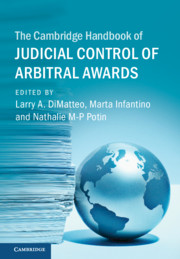Book contents
- The Cambridge Handbook of Judicial Control of Arbitral Awards
- The Cambridge Handbook of Judicial Control of Arbitral Awards
- Copyright page
- Dedication
- Concise Contents
- Contents
- Contributors
- Preface
- Part I Vacating Commercial Arbitration Awards
- Part II Enforcing Commercial Arbitration Awards
- Part III Scope and Interpretation of Arbitration Clauses
- Part IV Judicial Control of Arbitral Awards
- 10 Judicial Control of Arbitral Awards in Argentina
- 11 Judicial Control of Arbitral Awards in Australia
- 12 Judicial Control of Arbitral Awards in Bulgaria
- 13 Judicial Control of Arbitral Awards in Mainland China
- 14 Certain Aspects of Judicial Control of Arbitral Awards in France
- 15 Commercial Arbitration in Germany
- 16 Judicial Control of Arbitral Awards in Italy
- 17 Judicial Control of Arbitral Awards in Nigeria
- 18 Judicial Control of Arbitral Awards in Poland
- 19 Judicial Control of Arbitral Awards in Russia
- 20 Judicial Control of Arbitral Awards in Spain
- 21 Judicial Control of Arbitral Awards in Switzerland
- 22 Judicial Control of Arbitral Awards in Ukraine
- 23 Judicial Control of Arbitral Awards in the United Kingdom
- 24 Judicial Control of Arbitral Awards in the United States
- Part V Summary and Findings
21 - Judicial Control of Arbitral Awards in Switzerland
from Part IV - Judicial Control of Arbitral Awards
Published online by Cambridge University Press: 08 October 2020
- The Cambridge Handbook of Judicial Control of Arbitral Awards
- The Cambridge Handbook of Judicial Control of Arbitral Awards
- Copyright page
- Dedication
- Concise Contents
- Contents
- Contributors
- Preface
- Part I Vacating Commercial Arbitration Awards
- Part II Enforcing Commercial Arbitration Awards
- Part III Scope and Interpretation of Arbitration Clauses
- Part IV Judicial Control of Arbitral Awards
- 10 Judicial Control of Arbitral Awards in Argentina
- 11 Judicial Control of Arbitral Awards in Australia
- 12 Judicial Control of Arbitral Awards in Bulgaria
- 13 Judicial Control of Arbitral Awards in Mainland China
- 14 Certain Aspects of Judicial Control of Arbitral Awards in France
- 15 Commercial Arbitration in Germany
- 16 Judicial Control of Arbitral Awards in Italy
- 17 Judicial Control of Arbitral Awards in Nigeria
- 18 Judicial Control of Arbitral Awards in Poland
- 19 Judicial Control of Arbitral Awards in Russia
- 20 Judicial Control of Arbitral Awards in Spain
- 21 Judicial Control of Arbitral Awards in Switzerland
- 22 Judicial Control of Arbitral Awards in Ukraine
- 23 Judicial Control of Arbitral Awards in the United Kingdom
- 24 Judicial Control of Arbitral Awards in the United States
- Part V Summary and Findings
Summary
Switzerland has long been a New York Convention (NY Convention)1 state. Although Switzerland’s arbitration law is not based on the UNCITRAL Model Law (Model Law), it does by and large conform to the fundamental principles of the Model Law as amended in 2006, in particular in relation to the interpretation of arbitration agreements, and the vacation and enforcement of international arbitration awards.
Swiss law distinguishes between international arbitration and domestic arbitration. This proceeds from article 176 of Switzerland’s arbitration statute,of the Swiss Private International Law Act2 (PIL), which defines the scope of international arbitration as arbitrations with their seat in Switzerland and in which, at the time of the conclusion of the arbitration agreement,3 at least one of the parties had neither its domicile nor its habitual residence in Switzerland. Domicile for registered corporate entities is treated as the place of formal registration.4 For registered corporate entities, habitual residence does not apply. No other provision in Swiss international arbitration law is more stringent than those under the NY Convention.5
Keywords
- Type
- Chapter
- Information
- The Cambridge Handbook of Judicial Control of Arbitral Awards , pp. 336 - 351Publisher: Cambridge University PressPrint publication year: 2020

